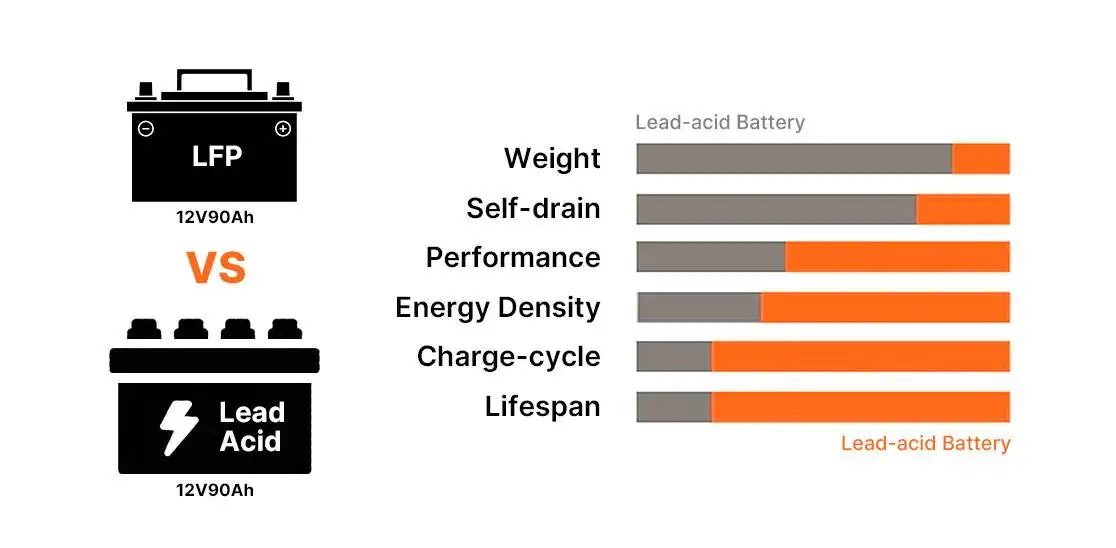Technology
12V 90Ah Lithium Battery vs. Lead-Acid Battery: Making the Right Choice

In the realm of energy storage, two prominent contenders stand out: the 12V 90Ah lithium battery and the lead-acid battery. Each offers its own set of advantages and drawbacks, making it crucial for consumers to weigh their options carefully before making a decision. In this comprehensive guide, we’ll delve into the differences between these two battery types, focusing on their features, performance, environmental impact, and applications.
Introduction to 12V 90Ah Lithium Battery and Lead-Acid Battery
The 12V 90Ah lithium battery and lead-acid battery are both widely used in various applications, including automotive, marine, and renewable energy systems. While both serve the fundamental purpose of storing and providing electrical energy, they differ significantly in terms of chemistry, performance, and cost.
Understanding the Basics: How Do 12V 90Ah Lithium Batteries and Lead-Acid Batteries Work?
12V 90Ah Lithium Battery
Lithium batteries utilize lithium-ion chemistry, where lithium ions move from the negative electrode (anode) to the positive electrode (cathode) during discharge and vice versa during charging. This process allows lithium batteries to store and release electrical energy efficiently.
Lead-Acid Battery
Lead-acid batteries, on the other hand, rely on the reaction between lead dioxide and lead to generate electricity. During discharge, sulfuric acid in the electrolyte reacts with lead and lead dioxide plates, producing lead sulfate and water. Reversing this reaction during charging replenishes the battery’s energy stores.
Advantages of 12V 90Ah Lithium Batteries over Lead-Acid Batteries
Higher Energy Density
One of the most significant advantages of 12V 90Ah lithium batteries is their higher energy density compared to lead-acid batteries. This means that lithium batteries can store more energy per unit volume or weight, resulting in a more compact and lightweight design.
Longer Lifespan
Lithium batteries typically have a longer lifespan than lead-acid batteries, with thousands of charge-discharge cycles before significant degradation occurs. This longevity translates to reduced maintenance requirements and longer intervals between battery replacements.
Faster Charging
Another notable benefit of lithium batteries is their faster charging capability. Lithium-ion chemistry allows for rapid charging without compromising battery health or performance, making lithium batteries ideal for applications where quick recharge times are essential.
Lightweight and Compact Design
Due to their higher energy density, lithium batteries are much lighter and more compact than lead-acid batteries with the same capacity. This makes them ideal for portable applications where space and weight are critical considerations, such as electric vehicles and solar energy storage systems.
Advantages of Lead-Acid Batteries over 12V 90Ah Lithium Batteries
Lower Initial Cost
Lead-acid batteries are generally more affordable upfront compared to lithium batteries, making them a cost-effective choice for budget-conscious consumers. While lithium batteries may offer long-term savings due to their longer lifespan and lower maintenance requirements, the initial investment can be higher.
Wider Availability
Lead-acid batteries have been around for much longer than lithium batteries and are therefore more widely available in various sizes and configurations. This accessibility makes lead-acid batteries a convenient choice for applications where immediate replacement or compatibility with existing systems is necessary.
Higher Tolerance to Overcharging
Lead-acid batteries are more forgiving when it comes to overcharging, as they can withstand higher voltages without sustaining damage. This makes them suitable for applications where charging conditions may be less controlled or where overcharging is a common occurrence.
Performance Comparison: 12V 90Ah Lithium Batteries vs. Lead-Acid Batteries
In terms of performance, 12V 90Ah lithium batteries outshine lead-acid batteries in several key areas:
Higher energy density translates to longer runtime and improved efficiency.
Faster charging allows for shorter recharge times and increased productivity.
Lower self-discharge rate ensures that stored energy is retained for longer periods.
Greater depth of discharge capability means more usable capacity before recharging is required.
Environmental Impact: Which Battery Type is More Eco-Friendly?
When it comes to environmental impact, lithium batteries are generally considered more eco-friendly than lead-acid batteries. This is due to several factors:
Lithium batteries contain fewer toxic materials and are easier to recycle.
Lead-acid batteries pose environmental risks due to their lead and sulfuric acid content, which can leach into soil and water if improperly disposed of.
The manufacturing process for lithium batteries is less resource-intensive and produces fewer greenhouse gas emissions compared to lead-acid batteries.
Applications: Where Are 12V 90Ah Lithium Batteries and Lead-Acid Batteries Used?
Both 12V 90Ah lithium batteries and lead-acid batteries find applications in a wide range of industries and sectors, including:
Automotive: Electric vehicles, hybrid vehicles, and start-stop systems.
Marine: Boat propulsion, onboard electronics, and lighting systems.
Renewable Energy: Solar energy storage, wind energy storage, and off-grid power systems.
Industrial: Backup power for telecommunications, uninterruptible power supplies (UPS), and emergency lighting.
Maintenance and Care: Tips for Prolonging the Life of Both Battery Types
Regardless of the battery type, proper maintenance and care are essential for maximizing performance and prolonging lifespan:
Regularly inspect batteries for signs of damage or corrosion.
Follow manufacturer guidelines for charging and discharging.
Keep batteries clean and free from dirt, debris, and moisture.
Store batteries in a cool, dry place away from direct sunlight and extreme temperatures.
Conclusion
In conclusion, the choice between a 12V 90Ah lithium battery and a lead-acid battery depends on various factors, including performance requirements, budget constraints, and environmental considerations. While lithium batteries offer superior energy density, longer lifespan, and faster charging, lead-acid batteries are more affordable upfront and widely available. Ultimately, consumers should weigh the pros and cons of each battery type carefully to determine which best suits their needs.






















